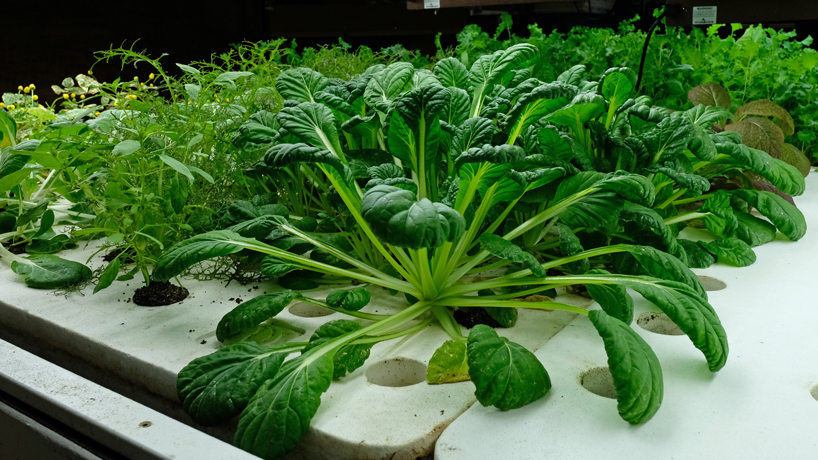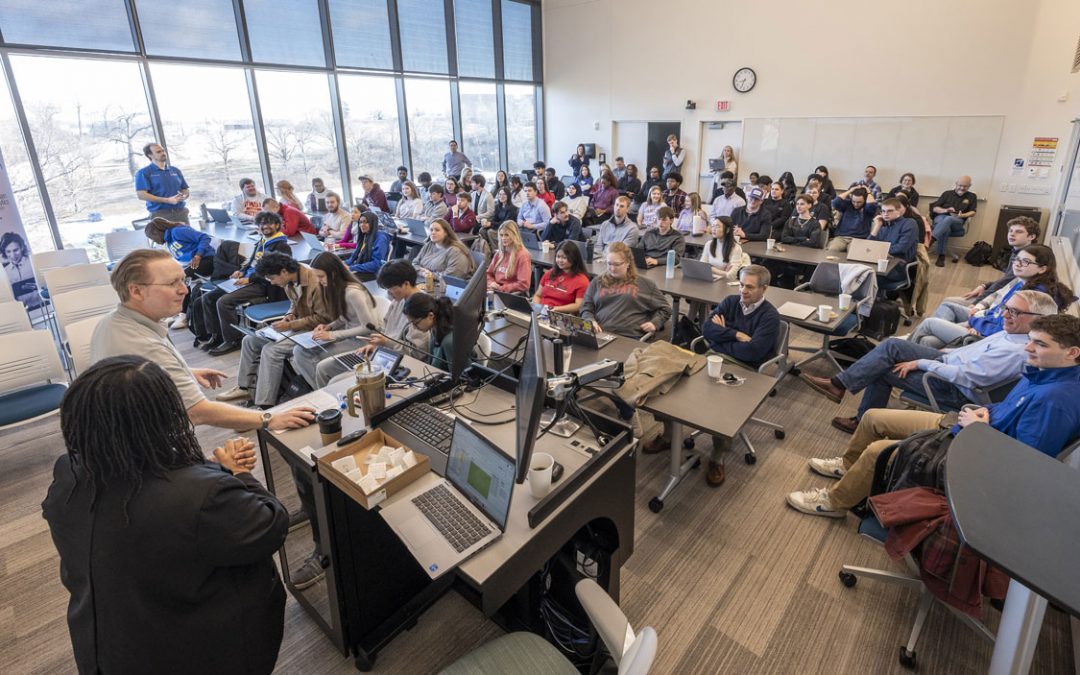
The planned Center of Excellence in indoor farming, to be located on UMSL’s North Campus, would work to increase the productivity and scalability of indoor, soilless farming methods – whether in the form of aquaponics, hydroponics, aeroponics or other methods of production – and could ultimately help enhance food equity and access. (Photo by August Jennewein)
Planning is underway for a Center of Excellence in indoor farming that would be housed on the campus of the University of Missouri–St. Louis.
The Yield Lab Institute is leading the efforts to develop the center, expected to reside on the northern part of the UMSL campus, not far from Express Scripts and Florissant Road. It is intended to have a dual focus on innovation, sharing knowledge, commercialization and best practices for indoor agriculture while also working to enhance food equity and access.
“As a primary partner to the Yield Lab Institute, we’ve been working throughout the course of the past year to do planning sessions with community stakeholders and identify the purposes and roles of the center,” said Karl Guenther, UMSL’s assistant vice chancellor for economic and community development. “We’ve been working with partners to flesh out strategies around how that center could come into reality on our North Campus.”
The university has joined with local stakeholders and national experts in everything from plant and crop science, energy, farming, banking and finance, as well as other private industries, as part of the St. Louis Controlled Environment Agriculture Coalition.
The coalition is aiming to take advantage of existing assets and expertise in plant science and agriculture as well as unique partnerships and innovative technologies to bring indoor, soilless farming operations to the region while increasing its productivity and scalability.
Such modern farming and food production – whether in the form of hydroponics, aeroponics, aquaponics or another method of production – can reduce many of the harmful effects of conventional farming, including the pressure it places on land and the losses it causes in natural habitats that can affect biodiversity. But indoor, soilless farming requires large energy footprints, and it’s been a challenge to engage in it in a commercially viable way.
“The center will support workforce development, business development and research and innovation – what technologies and growth setups are most successful and how do those innovations get to market?” Guenther said. “It will do this all while supporting greater food access.”
The need to improve access to healthy foods was one of the pieces of feedback Guenther and his colleagues heard often when engaging with community members about plans for the North County Business and Workforce District, to be built on South Campus. That sparked additional conversations with community partners about local and urban farming.
But it was Haitao Li, the chair of the Department of Supply Chain and Analytics in the College of Business Administration, who helped them make the connection to the Yield Lab Institute. The Yield Lab Institute wrote a letter of recommendation for Li’s winning Missouri Agricultural and Small Business Development Authority grant, supporting research on supply chain issues within indoor agriculture. He was already engaged in a project focused on indoor growing with other partners in the University of Missouri System.
“It’s a great example of how you can integrate different disciplines’ core knowledge streams to help out an innovative industry,” Guenther said. “Hopefully, through this center, we can be a partner to the community and industry in doing more of that kind of work.”
Advancing indoor agriculture involves solving a host of challenges involving science, engineering and business. In agriculture, decisions must be made about the type of food production, which resources to use, growth cycles and ways to most efficiently deliver food to consumers.
“It’s a chance to bring a lot of different disciplines together around a key issue: How do we sustainably and equitably feed our society?” Guenther said. “Being a part of the UM System, what we can do is bring the best of what UMSL does and support and partner across the system so that the expertise from MU Extension and the College of Agriculture, Food and Natural Resources and expertise at UMKC, all of that can be brought to bear in partnership around a center like this. And the center, in turn, allows us to further partner with other researchers, businesses, innovators, entrepreneurs, etc.”
“The Yield Lab Institute has been working on this effort for several years, starting with the life cycle assessment we co-published with the WWF in 2019 that mapped the St. Louis region and its indoor soilless agriculture ecosystem,” said Brandon Day, the chief operating officer of The Yield Lab Institute. “As we progressed this work, UMSL emerged as a committed partner to locate the Center of Excellence. UMSL’s location and redevelopment plans are naturally aligned with the plans for the center, which are to pilot, test, advance and commercialize inputs, technologies and businesses for modern food and agriculture production. Underpinning this effort is a desire to address food access and insecurity issues in metropolitan areas, chief among them in north St. Louis.”
The center would be run independently from the university, but its presence on campus would create opportunities for students – as well as neighbors in the surrounding community – to have access to training, research and innovation.
It would only enhance the region’s reputation as a leading center for agricultural technology as the home to institutions such as the Danforth Plant Science Center, the Helix BioIncubator Center, BRDG Park, EDGE at BRDG, BioSTL and 39 North.
“That’s a key point,” Guenther said. “This center is meant to be complementary to the other innovation districts and initiatives in the region tied to food and ag tech. That spirit of collaboration has been present throughout the planning for the center.”














